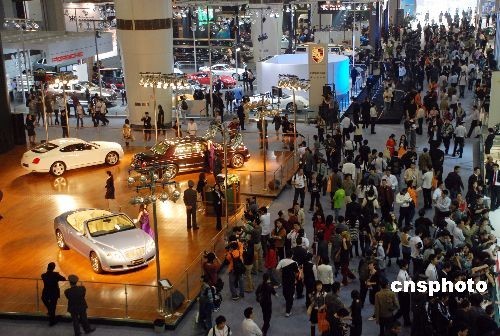China should encourage the development of electric cars to offset its dependence on imported oil and reduce greenhouse emissions, automakers said.
"We are discussing with the Chinese government about our electric car plan as environmental issues are becoming a critical issue in China," Yasuaki Hashimoto, president of Nissan Motor (China) Ltd said at the Guangzhou auto show.
 |
|
The Sixth Guangzhou International Auto Show was held on November 19, 2008. Automakers said that China should encourage the development of electric cars to offset its dependence on imported oil and reduce greenhouse emissions.
|
The company exhibited its Mixim concept electric car at the show which opened yesterday.
"China should be one of the most potential markets for electric cars," said Toshiaki Otani, general manager of Dongfeng Nissan Passenger Vehicle Co.
He told China Daily that Nissan, Japan's third-largest automaker, plans to make electric cars by 2010 and will bring them to China by 2012.
"It will be an ideal solution as the country seeks to boost sales of fuel-efficient vehicles to protect the environment and cut oil usage."
However, Otani admitted that performance, size and the cost of the batteries remained problems in terms of promoting electric cars.
"We still have to make efforts to lower the costs of batteries in order to offer electric cars at an acceptable price to Chinese consumers."
Expensive hybrid vehicles have failed to catch on in China, with Toyota Motor Corp's Prius, the bestselling model in China, notching up just 616 sales nationwide in the first nine months of the year.
German automaker Volkswagen also said it considers electric cars as its next step in its green technology research.
"We are looking for Chinese partners in the research and development of electric cars," said Winfried Vahland, president and CEO of Volkswagen Group China.
"And we hope the Chinese government can help promote the development and use of electric cars in China."
Volkswagen has made environmental technology its top priority in China in recent years. Last year, it began to produce its world-leading energy conservation engines in Dalian, achieving both high power performance and low fuel consumption.
Volkswagen has also cooperated with Shanghai's Tongji University on the development of fuel cell technologies.
China relies on imports for nearly half of its oil. "If China continues current growth rates it will almost double oil imports by 2030," said a recent McKinsey report. "But greater use of electric cars would cut this growth by around a quarter."